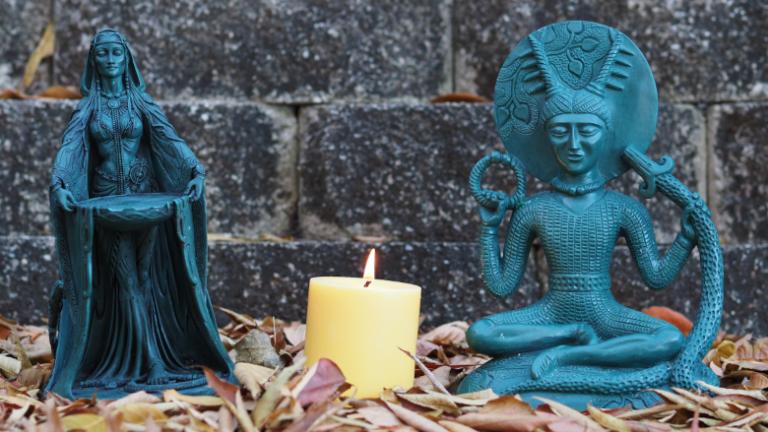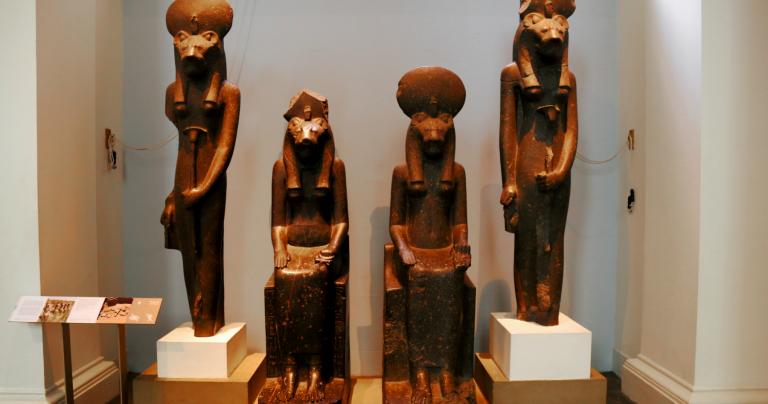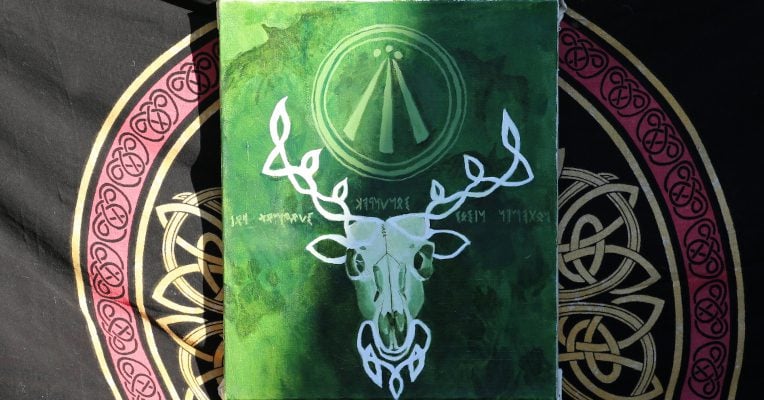Last week I came across a fundamentalist Christian leader who said that if the Bible isn’t inerrant and infallible (historically true and not just mythologically true, among other things) then Christians “know basically nothing” about their God.
What an unhelpful line of thinking.
On one hand, what Christians do or don’t believe is not my business. On the other hand, Christianity – especially Protestant Christianity with its doctrine of Sola Scriptura – is still the 800 pound gorilla in Western culture. This line of thinking often bleeds over into other religions and cultures, including our own Paganism and polytheism.
Epistemology is the branch of philosophy that deals with the question of how we know what we know. What is true and what is false, what is more likely and what is less likely, and how we can be confident that what we believe is, if not certainly true, at least reasonable. Epistemology is one of the starting points for building a robust metaphysics, our foundational assumptions about the world and how it works.
So rather than rebutting this particular fundamentalist and getting into theological details that don’t concern us, I’d rather use his words as motivation to engage in Pagan and polytheist epistemology.
How do we know what we know – what we think we know – about the many Gods?

A conclave of cats
Humans discussing the nature of the Gods is like a conclave of cats discussing the nature of humans. It wouldn’t be totally worthless. Cats are intelligent, and they’ve lived with humans long enough to know a few things about us. But at the end of the day, the proceedings of their conclave would say more about how cats see themselves than about the ultimate nature of humans.
Likewise, we’re intelligent, and we have formed and maintained relationships with many Gods over many years. We know a thing or two about Them. But when it comes to experience and wisdom, the Gods are at least as far beyond us as we are beyond cats. Our theologies say more about how we see ourselves than any absolute truth about the Gods.
With or without holy books, we can know a little about the Gods, but we should never become so arrogant as to think we know all there is to know about Them. Or even all we need to know about Them. That process of discovery, learning, and relationship-building is a work that will be in progress forever. Or, I suppose, until we reach apotheosis, which I’m not expecting to do in this lifetime or in any lifetime I can imagine.

A demand for certainty at any cost
Some people aren’t willing to accept that they’re cats. They demand certainty around matters that are inherently uncertain – things that aren’t just beyond our knowledge, but beyond our ability to know.
This is particularly important in religions that teach believing the “right” things means eternal bliss and believing the “wrong” things means eternal torment. The impossibility of being absolutely certain about something of such importance was one of the main things that convinced me fundamentalism was false.
Humans have had speech for at least a couple hundred thousand years. We’ve had writing for around 5000 years. From a deep time perspective, writing is still the new technology everybody thinks is cool. We value the written word and trust the written word far more than other sources. Sometimes that’s a good thing – writing is helpful (says the writer). But as anybody who’s ever read a conspiracy theory book or website knows, it’s not always a good thing. No source – written or otherwise – can be accepted without careful examination and criticism.
When your whole religion – including the fate of your soul – is tied up in a book, you will tend to accept what you read uncritically and rationalize any discrepancies away. Christian fundamentalists demand certainty, even at the cost of their intellectual integrity.
Pagans and polytheists aren’t exempt from this. Sometimes we overvalue our written sources because we live in a culture saturated with Protestant thinking. But other times we fall prey to the same demand for certainty all on our own.
We know the Gods from the lore
That said, where we have lore – both written records and oral traditions – it’s the first way by which we know the Gods.
The stories our ancestors told about the Gods are treasures. We should read them plainly but not literally. They are not historical accounts nor are they corrupted history, even though bits of history can often be found in them. They’re myths – stories that tell us who we are, where we came from, and how we should live. We can learn much about the Gods from the stories we have about Them.
But our ancestors were cats too. Their stories tell us something about the Gods, but mainly they tell us how our ancestors understood Them and related to Them.
Even the historical records we have about how ancient people worshipped the Gods must be interpreted in the context of the place and time where they were written. One of the major errors of fundamentalists – in any religion – is mistaking ancient cultural norms for eternal truths. The same Christians who dismiss how the Bible condones slavery as “part of the culture of that time” still cling to similarly archaic ideas about women and LGBTQ people.
We must not make the same mistakes.
Still, the lore we have about the Gods is invaluable. Read it and study it, in the original language where you can (I can’t) and in as current and as faithful a translation as you can find where you can’t.
We know the Gods from our first-hand experiences of Them
Most theistic religions talk about a time when Gods walked with humans. Not all the time, but often enough that encountering a God was a distinct possibility. And now that doesn’t happen anymore… or so the story goes.
A cynic would say the clergy want to control access to the Gods, and so they say such experiences are no longer possible. Sadly, in many cases that cynic would be right. But a good religion is a living religion, and the Gods who spoke to our ancestors will speak to us, if we will listen.
Sometimes this comes in ecstatic experiences, where a God moves into a person and speaks through them. I’ve experienced this a few times – these are some of the deepest, most meaningful, and most real experiences of my life.
We often call these experiences UPG – unverified personal gnosis. In doing so, we acknowledge that even the people who were there at the time can’t be sure that was Cernunnos or the Morrigan or whoever it was speaking through the person. And so the messages are only authoritative for those who choose to accept them. But when multiple people in multiple places have similar experiences with similar messages, it lends credibility to the process. And when time proves the truth and wisdom in them, we learn to trust them.
In doing so our religions and the relationships that comprise them are strengthened.
And in the process, we learn a little more about our Gods.

We know the Gods from our ordinary experiences of Them
Not everyone has ecstatic experiences. Most people don’t. Yet most if not all of us can have more subtle experiences of our Gods.
We pray and meditate, and we hear a response. Not with our ears, but with our intuition – especially with our bodies. We make offerings, and we find that a gift is returned for a gift. We live according to the virtues of our Gods, and we find ourselves becoming more and more like Them.
I’m a cat too, and there is much about the Gods I do not know. But I am certain of this – the Gods have no use for spectacle, or for those who demand it.
But those who seek the Gods and who follow the Gods will learn something important about the Gods in their ordinary experiences.
We know the Gods from the experiences of others
We don’t have to do this alone. Religion is a group project and it goes better when we do it together. What that looks like in a culture where organized religion is shrinking rapidly in favor of solitary practice remains to be seen. But even if we aren’t gathering together weekly or monthly or seasonally, we can still know things about the Gods from the experiences of others.
I’ve learned a lot about the Morrigan from Morpheus Ravenna and from Morgan Daimler. I’ve learned a lot about Cerridwen from Kristoffer Hughes.
There is no ancient lore about Cernunnos, but some of us put our own stories together and created some contemporary lore for Him.
Loki didn’t speak to me at Mystic South in 2022, but I heard Him speak through a Seeress, and I learned about Him through her.
I’ve learned a lot about Brighid from watching my Brigidine friends respond to the problems in our current world, especially in their work to provide hospitality where it is most needed.
Our own experiences are important. But we can also know the Gods through the experiences of others.
The epistemology of the Gods
I am eternally curious. Whatever the question, I want to know! But my integrity reminds me that ultimately, I’m still a cat contemplating the nature of humans. There is much I cannot know, and more than I can know only partially and tentatively. I’ll take what I can get.
Because what we can get is good enough.
We start with the lore we have, with the full understanding that it is the stories our ancestors told about the Gods, not historical accounts of the Gods. What we learn from our own experiences – great and small – helps recenter the Gods in our contemporary world. What we learn from others adds to our knowledge and serves to calibrate our thinking – it helps keep us from going in unwise and unsupported directions.
This is the epistemology of the many Gods. By building our knowledge of the Gods, we learn how to better relate to Them, how to worship and work with and work for Them, and how to embody Their values and virtues in this world.

















